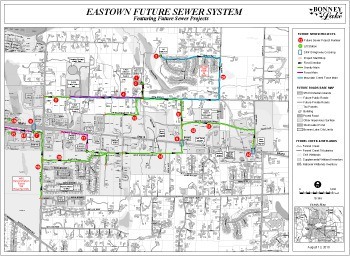With the City Council’s decision to turn down a utility latecomers agreement, the big question for residents and city staff regards what happens next.
“It was a disappointment and it was a shock,” said Roger Watt, an Eastown landowner and unofficial spokesperson for the limited liability corporation created to allow landowners to speak with a single voice and negotiate with the city. “I’m not sure what we’ll do now.”
The council on July 24 voted down the utility latecomers agreement in a 4-3 vote. The agreement was designed to provide a funding mechanism to put sewers into the ground in the Eastown section of the city.
Presently, the area does not have a sewer line and city code requires any new development to hook into the system, no matter how far pipes have to be laid to connect to the current lines.
At a cost of more than $4 million to complete a “backbone” system, landowners have complained that developers are not buying their land due to the additional requirements of installing sewers.
Beginning in 2009, the city and a group of landowners began working on an agreement in which they would partner to provide the up-front cost of the sewer lines and get paid back as developers hooked into the system.
The council even passed a new ordinance lowering the minimum investment by the city’s partner in a latecomer’s agreement to 5 percent to make it easier on the landowners.
The amount contributed by the Eastown LLC would have been $201,105.
But at the July 24 meeting, the council voted down the agreement with those opposed saying they did not want to risk ratepayer money on the sewer lines without a guaranteed return and also remarked on comments made by Watt, speaking for the LLC, during the public hearing on the agreement.
Members of the council characterized Watt’s remarks as “demands” and said they were put off by the tone of the city’s junior partner.
Watt disagreed that any demands were made. His comments asked for clarification regarding the LLC’s payment schedule – though Watt said they were prepared to deliver a check right after the meeting, had the agreement passed – and discussed what the landowners saw as a potential inequality if those outside the current Eastown designation were allowed to hook into the system in the future.
But the failure of the agreement means the future of development in the area is still up in the air.
“The question is what, if anything, will they approve?” said Public Works director Dan Grigsby, who worked with the council and LLC on the development of the agreement.
The council discussed the possibility of allowing development on septic systems, but Grigsby said that also opens a whole new set of questions the council must answer – including the conditions under which a septic system would be allowed – before anything new is done.
Grigsby said his staff is awaiting direction from the council before going any further.
Mayor Neil Johnson, who supported the agreement, said the administration would continue to work to address the issue of sewers in Eastown.
“I don’t think we stop,” he said. “We need to find a solution.”
Johnson said there is a possibility of a smaller system, as well as the septic solution, though he agreed there are questions still to answered going either of those routes.
“The key is how do we start getting there?” he said.
Johnson said the council’s concerns were legitimate, and though he is confident that development would begin within five years, there are no guarantees.
Deputy Mayor Dan Swatman, who also supported the measure and who creates the agendas for council meetings, said Eastown sewers would be back on the table during the Aug. 21 workshop.
“We can’t do nothing,” he said. “They need either septics or sewers; one or the other.”
Swatman said there were “a lot of issues” still outstanding regarding septics. Swatman cited the difficulty in building multi-family development-sized septic systems and said he believed the area would remain “underdeveloped” without sewer lines.
He also said the commercial sector provides much of the money needed to run the city and more businesses building in Eastown means more money for sidewalks, parks and other additions to the city.
“That’s our last, large commercial area in the city,” Swatman said. “There’s a lot of potential sitting there. We have to do something.”
But for the members of the LLC, the future is now and no one is quite sure what to do next.
“We’re still trying to sort it out,” Watt said, adding that he is not in favor of variances for septic systems because he too agreed there are too many questions that would still need to be answered.
Watt said the group was going to “let the dust settle” from the decision and then see if there was any possibility of “resurrecting” the ULA, though he is not particularly optimistic.
“I believe at this point the answer is probably no,” he said.
Once that decision is made, the future of the LLC will be decided, though Watt said he expects the corporation to disband and return everyone’s money while they “hope for a better day.”



